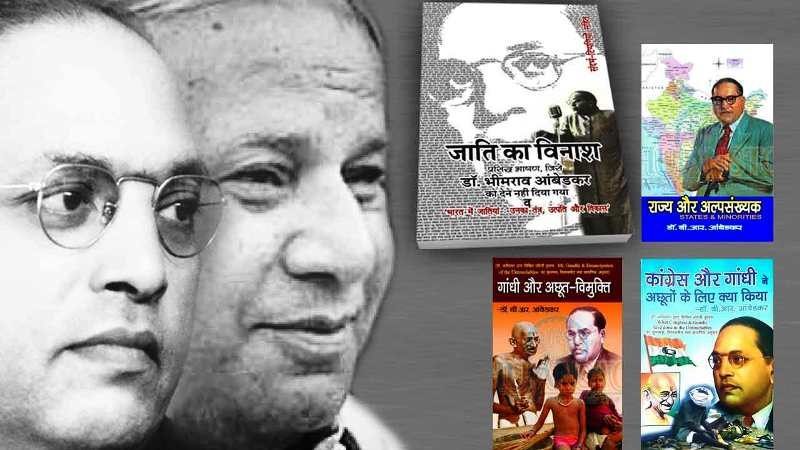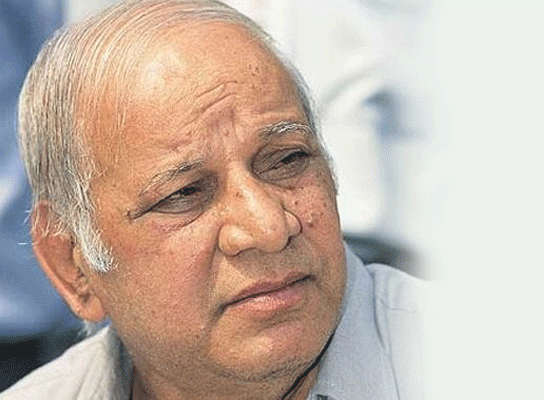Kanshi Ram spread the message of Babasaheb enthusiastically across northern India. For this, he studied the books written by Dr Ambedkar exhaustively. In his only book, Kanshi Ram mentions the books by Babasaheb that guided him on his path. These are the books in which Dr Ambedkar has laid out his dreams, ideals, thoughts as well as a clear plan for bring about change:
- Castes in India: Their Mechanism, Genesis and Development (1916)
- The Annihilation of Caste (1936)
- Mr Gandhi and the Emancipation of the Untouchables (1943)
- What Congress and Gandhi have done to the Untouchables (1945)
- States and Minorities (1947)
Of these, Kanshi Ram mentions Castes in India: Their Mechanism, Genesis and Development at the top of his list. This material of the book is a paper that Dr Ambedkar presented in Columbia University on 9 May 1916 at a seminar on Anthropology. The paper was then published in Volume XLI of The Indian Antiquary in May 1917. In this his first research paper, Babasaheb has presented a detailed description of how caste originated in India, its growth, as well as its impact. He has not only presented all the contemporary definitions of caste of his time but also presented his own conclusions. What he concludes is that Indian society, like other societies, was divided into four groups. First being the priests or “Brahmans”, followed by the warriors or “Kshatriyas”, then the businessmen or “Vaishyas” and finally the craftsmen and serving class or “Shudras”.
It was an open system and any person, depending on their ability and desire, could choose their group freely. At some point in history the priests or “Brahmans” isolated themselves adopted a policy of living in “closed quarters” and declared themselves a caste. A caste is not an independent entity. It is an integral part of the Hindu social system. Caste originated when the “priestly class” declared themselves a ‘closed class’. The meaning of a closed class means the prohibition of inter-caste marriage. The main objective of caste was that marriages be held between people of the same caste. The ban on widows remarrying and the sanctioning of child marriage and Sati were intended at keeping marriages within castes. The Hindu scriptures glorified these social ills.
BUY FORWARD PRESS BOOKS FROM THE COMFORT OF YOUR HOMES
Dr Ambedkar published his second book The Annihilation of Caste in English in 1936. This is actually a speech Ambedkar had written for the presidential address that the office bearers of the Jat Pat Todak Mandal had invited him to deliver at their annual session. However, differences with Ambedkar on the subject of annihilating caste led the organizers to cancel the event altogether. This historical speech couldn’t be delivered. Then Ambedkar published the speech in the form of a book at his own expense. There were a lot of reactions when the speech appeared in print. Ambedkar responded to Gandhi’s reaction and incorporated his and other letters in the second edition. By then Ambedkar had become known as a top scholar and the leader of the Untouchables.
Ambedkar was hurt by the possible consequences of the Poona Pact, had understood Gandhi’s shrewdness and had declared that he would be leaving the Hindu fold. Normally, he would never attend meetings of the upper castes but he had accepted the invitation of the Jat Pat Todak Mandal despite ill health. Eventually, even that meeting was cancelled. This book is sort of a sequel to Castes in India.

The third book that Kanshiram treasured was Mr Gandhi and the Emancipation of the Untouchables. This was also originally a paper, which Ambedkar presented in 1942 at a conference on ‘The problems faced by India’s Untouchables’ organized by the Institute of Pacific Relations, Canada. The paper was published in the proceedings of the conference. In 1943, Ambedkar had the paper published as a book. Ambedkar tells the world’s intellectuals and freedom-loving people about the plight of all Dalits. He writes that the 60 million Untouchables of India cannot not be compared any of other oppressed and exploited communities of the world. The slaves of Rome, the helots of Sparta, the villeins of England, the Negroes of America, the Jews of Germany – the plight of the Untouchables is much worse, Ambedkar wrote. The Untouchables are not only looked down upon but are also denied all opportunities to progress, he wrote, yet none of this has caught anyone’s attention. The book makes a scathing remark on the independence movement. He has written that the Hindus and Muslims’ longing is not for independence but for their rule. He has demanded a separate election board, a separate electorate, separate settlements for the Untouchables; their representation in the executive, legislature and administrative services at least in proportion to their population; as well as provisions in the Constitution for the social, educational and economic upliftment.
Ambedkar published the fourth book What Congress and Gandhi have done to the Untouchables in 1945 to expose the hollowness of the policies of Gandhi and Congress with respect to the Untouchables. The book runs into 400 pages. He evaluates the Congress’ exploits during the period 1917-1945 from the point of view of an Untouchable. The book also gives a detailed account of the movements of the Untouchables. It has a separate chapter titled “Gandhism”.

The fifth book by Ambedkar on Kanshi Ram’s list was a petition that Babasaheb wrote on behalf of the All India Scheduled Castes Confederation to the Constitution Assembly for the protection of the Untouchables. He published this petition as a book on 15 March 1947. The book contains the draft constitution and is also known as Babasaheb’s original constitution. The book contains proposals on the fundamental rights of the Scheduled Castes and the nationalisation of agriculture, large and basic industries, banks, insurance and more. It lays out Ambedkar’s economic policies, known as ‘state socialism’, in detail.
The contours of Ambedkar’s philosophy emerge from these books. By studying them, Kanshi Ram had identified the fundamentals of the philosophy. Kanshi Ram not only grasped Babasaheb’s philosophy but also analysed and practised it. That is the reason intellectuals and activists who want to turn the India of Ambedkar’s dreams into reality should read Kanshi Ram’s only book Chamcha Yug along with Ambedkar’s works.
Translation: Susmita; copy-editing: Zeeshan/Anil
Forward Press also publishes books on Bahujan issues. Forward Press Books sheds light on the widespread problems as well as the finer aspects of Bahujan (Dalit, OBC, Adivasi, Nomadic, Pasmanda) society, culture, literature and politics. Contact us for a list of FP Books’ titles and to order. Mobile: +917827427311, Email: info@forwardmagazine.in)
The titles from Forward Press Books are also available on Kindle and these e-books cost less than their print versions. Browse and buy:
The Case for Bahujan Literature
Dalit Panthers: An Authoritative History






